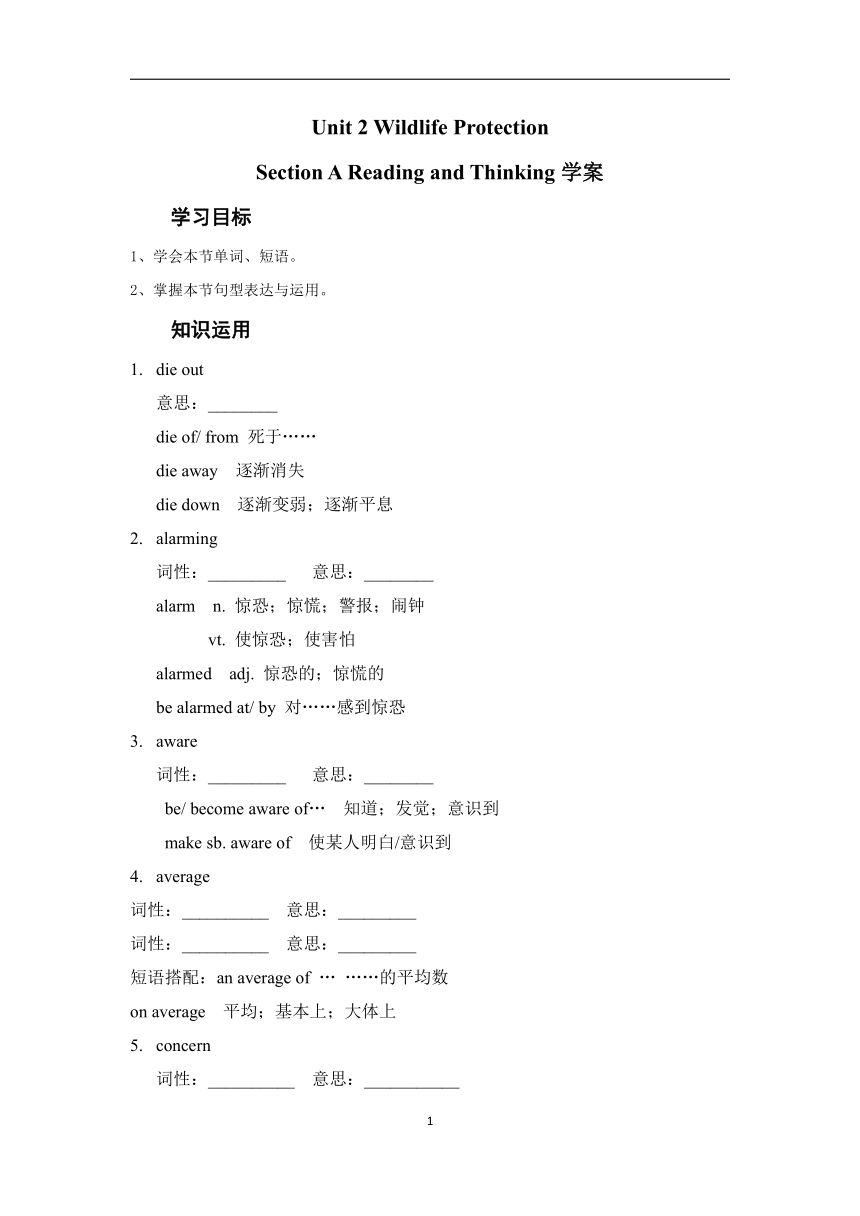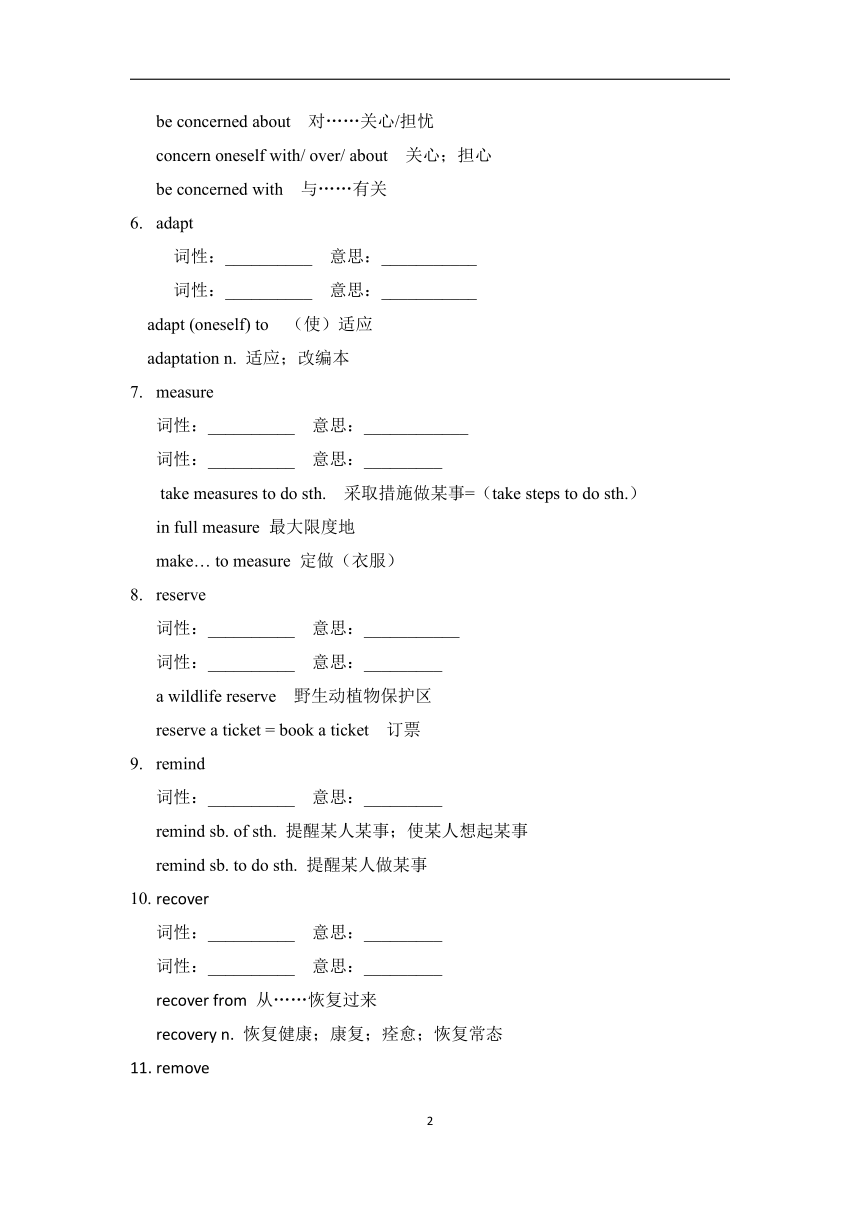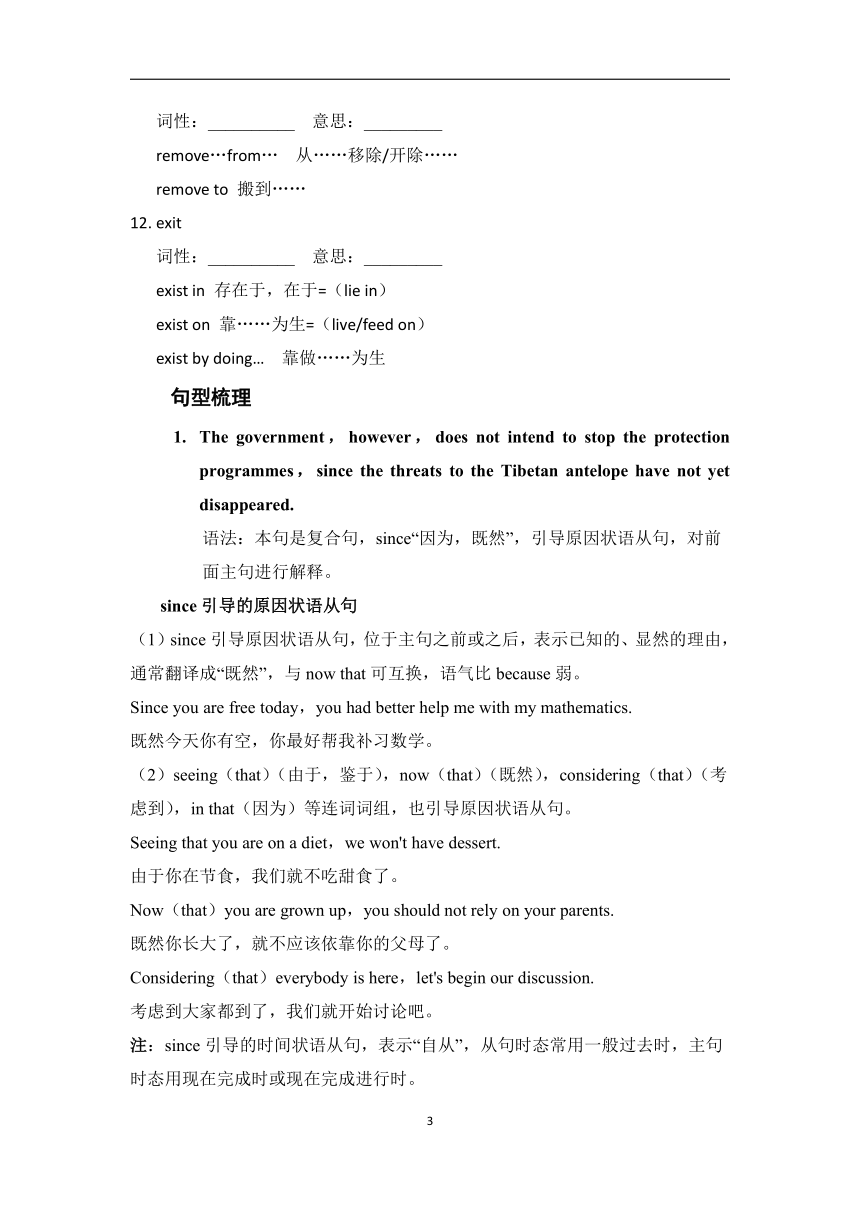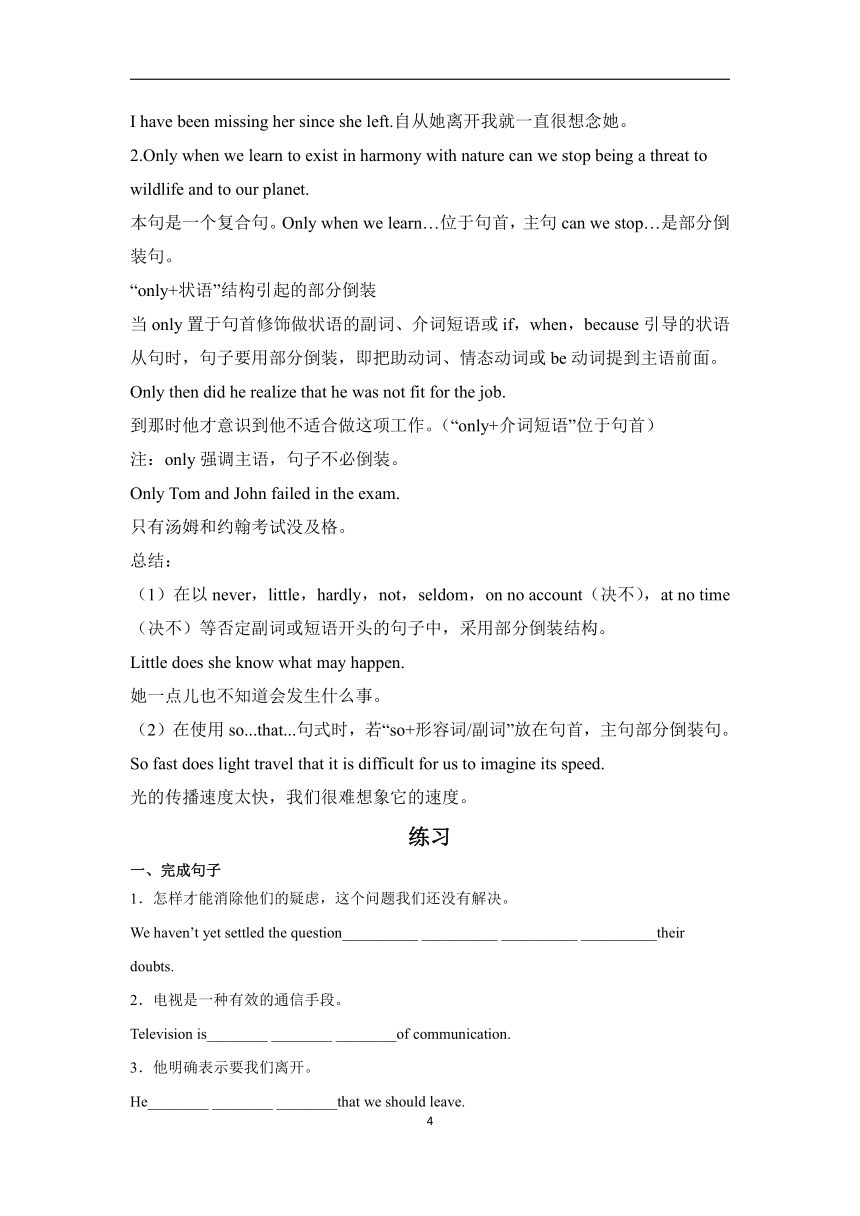人教版(2019)必修第二册Unit 2 Wildlife Protection Section A Reading and Thinking 学案-(有答案)
文档属性
| 名称 | 人教版(2019)必修第二册Unit 2 Wildlife Protection Section A Reading and Thinking 学案-(有答案) |

|
|
| 格式 | docx | ||
| 文件大小 | 2.4MB | ||
| 资源类型 | 教案 | ||
| 版本资源 | 人教版(2019) | ||
| 科目 | 英语 | ||
| 更新时间 | 2022-11-15 15:21:03 | ||
图片预览




文档简介
Unit 2 Wildlife Protection
Section A Reading and Thinking学案
学习目标
1、学会本节单词、短语。
2、掌握本节句型表达与运用。
知识运用
die out
意思:________
die of/ from 死于……
die away 逐渐消失
die down 逐渐变弱;逐渐平息
alarming
词性:_________ 意思:________
alarm n. 惊恐;惊慌;警报;闹钟
vt. 使惊恐;使害怕
alarmed adj. 惊恐的;惊慌的
be alarmed at/ by 对……感到惊恐
aware
词性:_________ 意思:________
be/ become aware of… 知道;发觉;意识到
make sb. aware of 使某人明白/意识到
average
词性:__________ 意思:_________
词性:__________ 意思:_________
短语搭配:an average of … ……的平均数
on average 平均;基本上;大体上
concern
词性:__________ 意思:___________
be concerned about 对……关心/担忧
concern oneself with/ over/ about 关心;担心
be concerned with 与……有关
adapt
词性:__________ 意思:___________
词性:__________ 意思:___________
adapt (oneself) to (使)适应
adaptation n. 适应;改编本
measure
词性:__________ 意思:____________
词性:__________ 意思:_________
take measures to do sth. 采取措施做某事=(take steps to do sth.)
in full measure 最大限度地
make… to measure 定做(衣服)
reserve
词性:__________ 意思:___________
词性:__________ 意思:_________
a wildlife reserve 野生动植物保护区
reserve a ticket = book a ticket 订票
remind
词性:__________ 意思:_________
remind sb. of sth. 提醒某人某事;使某人想起某事
remind sb. to do sth. 提醒某人做某事
recover
词性:__________ 意思:_________
词性:__________ 意思:_________
recover from 从……恢复过来
recovery n. 恢复健康;康复;痊愈;恢复常态
remove
词性:__________ 意思:_________
remove…from… 从……移除/开除……
remove to 搬到……
exit
词性:__________ 意思:_________
exist in 存在于,在于=(lie in)
exist on 靠……为生=(live/feed on)
exist by doing… 靠做……为生
句型梳理
The government,however,does not intend to stop the protection programmes,since the threats to the Tibetan antelope have not yet disappeared.
语法:本句是复合句,since“因为,既然”,引导原因状语从句,对前面主句进行解释。
since引导的原因状语从句
(1)since引导原因状语从句,位于主句之前或之后,表示已知的、显然的理由,通常翻译成“既然”,与now that可互换,语气比because弱。
Since you are free today,you had better help me with my mathematics.
既然今天你有空,你最好帮我补习数学。
(2)seeing(that)(由于,鉴于),now(that)(既然),considering(that)(考虑到),in that(因为)等连词词组,也引导原因状语从句。
Seeing that you are on a diet,we won't have dessert.
由于你在节食,我们就不吃甜食了。
Now(that)you are grown up,you should not rely on your parents.
既然你长大了,就不应该依靠你的父母了。
Considering(that)everybody is here,let's begin our discussion.
考虑到大家都到了,我们就开始讨论吧。
注:since引导的时间状语从句,表示“自从”,从句时态常用一般过去时,主句时态用现在完成时或现在完成进行时。
I have been missing her since she left.自从她离开我就一直很想念她。
2.Only when we learn to exist in harmony with nature can we stop being a threat to wildlife and to our planet.
本句是一个复合句。Only when we learn…位于句首,主句can we stop…是部分倒装句。
“only+状语”结构引起的部分倒装
当only置于句首修饰做状语的副词、介词短语或if,when,because引导的状语从句时,句子要用部分倒装,即把助动词、情态动词或be动词提到主语前面。
Only then did he realize that he was not fit for the job.
到那时他才意识到他不适合做这项工作。(“only+介词短语”位于句首)
注:only强调主语,句子不必倒装。
Only Tom and John failed in the exam.
只有汤姆和约翰考试没及格。
总结:
(1)在以never,little,hardly,not,seldom,on no account(决不),at no time(决不)等否定副词或短语开头的句子中,采用部分倒装结构。
Little does she know what may happen.
她一点儿也不知道会发生什么事。
(2)在使用so...that...句式时,若“so+形容词/副词”放在句首,主句部分倒装句。
So fast does light travel that it is difficult for us to imagine its speed.
光的传播速度太快,我们很难想象它的速度。
练习
一、完成句子
1.怎样才能消除他们的疑虑,这个问题我们还没有解决。
We haven’t yet settled the question__________ __________ __________ __________their doubts.
2.电视是一种有效的通信手段。
Television is________ ________ ________of communication.
3.他明确表示要我们离开。
He________ ________ ________that we should leave.
4.有些人把电脑看成是对他们工作的一种威胁。
Some people see computers as ________________ their jobs.
5.我希望我们的友谊能早日恢复。
I wish________ ________ ________ ________soon.
6.两周前我使用你们的购物app下了订单,但是我还没有收到货物。(goods)
I placed an order using your shopping app two weeks ago, but I still ________.
7.跳舞提醒我我还活着。
Dancing________ ________I’m alive.
8.我们必须采取有效措施以便减少二氧化碳的排放。
We must________ to reduce________.
9.这是一个安静、平和的夜晚,唤起了他童年时代的圣诞回忆。(remind)
It was a peaceful and quiet night, ______________________________ his own Christmas memories of childhood.
10.一句多译
我原本打算去北京,但是我没有买到票。
1.________, but I didn’t get the ticket.
2.________, but I didn’t get the ticket.
二、阅读理解
Wild animals are our friends, but many of them are getting fewer and fewer. We should try to protect them. The four animals below are now in danger. Tibetan Antelopes
Tibetan antelopes are medium-sized animals. They mainly feed on grass. They are usually found in groups of about 20. They are killed for their wool, which is warm, soft and fine and can be made into expensive clothes. Although people can get the wool without killing the animals, people simply kill them before taking the wool. The number of them is dropping year by year. There are less than 75,000 Tibetan antelopes left in the world, down from a million 50 years ago.
Golden Monkeys
Golden monkeys are mainly found in Sichuan, Gansu, Shaanxi provinces and Shengnongjia mountainous area of Hubei Province. Golden monkeys have golden-orange fur. They move around in the daytime, usually in groups of as many as 100 to 200 heads, or 20 to 30 heads. They feed on fruits and young leaves of bamboos. But people are destroying the environment where they live. Trees and bamboos are disappearing, so golden monkeys have less and less to eat.
Elephants
Elephants are very big and strong. They are bigger than any other animals on land. They are grey and have long trunks and tusks. They have poor eyesight, but very good hearing and smell. They can lift heavy things and breakdown branches with their trunks. Elephants are very friendly towards each other and towards their neighbours. Normally, they live in a group for many years. Young male elephants do not leave the group until they are about 12 years old. Now, there are very few elephants in the world. The number of them is becoming smaller and smaller because their living areas are used for farming. Also, people hunt them for their tusks.
Wolves
Wolves are not very big. They have grey fur. Wolves have very good eyesight, hearing and smell. Wolves’ food is various. They eat animals, insects and snails. They are friendly to each other and never attack people. They do not kill for fun. Wolves are in danger, too. They are losing their living areas because people cut down forests. Soon they will have no home or food.
11.Which of the following animals are the biggest on land
A.Tibetan antelopes. B.Golden monkeys.
C.Elephants. D.Wolves.
12.What can we know about the passage
A.There are less than 7,500 Tibetan antelopes left in the world now.
B.Golden monkeys usually move around during the night.
C.Elephants have good eyesight, but very poor hearing and smell.
D.Wolves are friendly to each other and they never attack people.
13.What can be the best title of the passage
A.Wild animals in danger
B.How to hunt wild animals
C.Animals in the zoo
D.How to train the animals
参考答案:
1. how we can remove
【详解】考查同位语从句。说明question的内容,引导同位语从句,从句中缺少方式状语,应用how引导;主语为we,表示“消除”应用remove,can后跟动词原形。故填how we can remove。
2. an effective means
【详解】考查冠词、形容词及名词。结合句意可知,此处表示泛指,故用不定冠词,means表示“手段”,用形容词effective表示“有效的”作定语,且effective为元音音素开头的单词,故用不定冠词an。故填an;effective;means。
3. made it plain
【详解】考查固定短语和时态。make it plain that...明确说明,it是形式宾语,that引导宾语从句。陈述过去事情,用一般过去时。根据句意,故填made it plain。
4.a threat to
【详解】考查名词。结合句意表示“对……的威胁”可知短语为threat to,此处泛指一种威胁,应用不定冠词a修饰名词threat。故填a threat to。
5. our friendship would recover
【详解】考查虚拟语气。wish后的宾语从句应用虚拟语气,表示对将来情况的虚拟,从句谓语部分为:would+动词原形。“恢复”是recover,“我们的友谊”是our friendship。故填our friendship would recover。
6.haven’t received the goods
【详解】考查时态。表示“收到”应用动词receive;表示“货物”应用名词goods。分析句子可知,此处应用现在完成时,强调过去的动作对现在造成的影响。故填haven’t received the goods。
7. reminds me
【详解】考查时态。根据句意,空处应用动词remind,表示“提醒”,后接人称代词的宾格形式me,表示“我”,I’m是I am的缩写,由此可知,句子使用一般现在时,主语是dancing,谓语动词应用第三人称单数形式。故填reminds me。
8. adopt effective measures the release of carbon dioxide
【详解】考查动词原形、形容词和名词所有格。情态动词must后接动词原形,动词adopt (采取),形容词effective (有效的)作定语,修饰复数名词measures (措施),名词所有格结构the release of carbon dioxide (二氧化碳的排放),故填①adopt effective measures ②the release of carbon dioxide。
9.reminding him of
【详解】考查非谓语动词。remind sb. of sth.意为“使某人想起某事”。分析句子结构可知,It was a peaceful and quiet night是主系表结构,则逗号后的成分是状语,结合句意,night和动词remind之间是逻辑上的主谓关系,所以此处应用现在分词形式reminding,表主动,reminding后面接宾格him,him作reminding的宾语,指代“他”。故填reminding him of。
10. I intended to have gone to Beijing I had intended to go to Beijing
【详解】考查固定短语和时态。intend to have done sth.或had intended to do sth.是固定结构,均意为“原本打算做某事却没有做”,根据后文可知,时态应用过去的时态,“打算去北京”这个动作应发生在“没有买到票”这个动作之前,因此空处1可填不定式的完成时结构,即I intended to have gone to Beijing,而空处2的谓语动词则可用过去完成时,即I had intended to go to Beijing。故填①I intended to have gone to Beijing;②I had intended to go to Beijing。
11.C 12.D 13.A
【分析】本文是一篇说明文。作者介绍了四种濒危的野生动物及他们的生活状况,并呼吁大家尽力保护野生动物。
11.细节理解题。根据Elephants部分的“They are bigger than any other animals on land.(它们比陆地上的任何其他动物都大)”可知,陆地上最大动物是大象。故选C。
12.细节理解题。根据Wolves部分的“They are friendly to each other and never attack people.(它们彼此友好,从不攻击人类)”可知,狼彼此友好从未攻击过人类。故选D。
13.主旨大意题。通读全文,并结合首段“Wild animals are our friends, but many of them are getting fewer and fewer. We should try to protect them. The four animals below are now in danger.(野生动物是我们的朋友,但它们中的许多人越来越少了。我们应该尽力保护它们。下面的四只动物现在处于危险之中) ”可知,短文中的这些野生动物都面临生存危机。故最佳标题是“濒临危险的动物们”。故选A。
2
Section A Reading and Thinking学案
学习目标
1、学会本节单词、短语。
2、掌握本节句型表达与运用。
知识运用
die out
意思:________
die of/ from 死于……
die away 逐渐消失
die down 逐渐变弱;逐渐平息
alarming
词性:_________ 意思:________
alarm n. 惊恐;惊慌;警报;闹钟
vt. 使惊恐;使害怕
alarmed adj. 惊恐的;惊慌的
be alarmed at/ by 对……感到惊恐
aware
词性:_________ 意思:________
be/ become aware of… 知道;发觉;意识到
make sb. aware of 使某人明白/意识到
average
词性:__________ 意思:_________
词性:__________ 意思:_________
短语搭配:an average of … ……的平均数
on average 平均;基本上;大体上
concern
词性:__________ 意思:___________
be concerned about 对……关心/担忧
concern oneself with/ over/ about 关心;担心
be concerned with 与……有关
adapt
词性:__________ 意思:___________
词性:__________ 意思:___________
adapt (oneself) to (使)适应
adaptation n. 适应;改编本
measure
词性:__________ 意思:____________
词性:__________ 意思:_________
take measures to do sth. 采取措施做某事=(take steps to do sth.)
in full measure 最大限度地
make… to measure 定做(衣服)
reserve
词性:__________ 意思:___________
词性:__________ 意思:_________
a wildlife reserve 野生动植物保护区
reserve a ticket = book a ticket 订票
remind
词性:__________ 意思:_________
remind sb. of sth. 提醒某人某事;使某人想起某事
remind sb. to do sth. 提醒某人做某事
recover
词性:__________ 意思:_________
词性:__________ 意思:_________
recover from 从……恢复过来
recovery n. 恢复健康;康复;痊愈;恢复常态
remove
词性:__________ 意思:_________
remove…from… 从……移除/开除……
remove to 搬到……
exit
词性:__________ 意思:_________
exist in 存在于,在于=(lie in)
exist on 靠……为生=(live/feed on)
exist by doing… 靠做……为生
句型梳理
The government,however,does not intend to stop the protection programmes,since the threats to the Tibetan antelope have not yet disappeared.
语法:本句是复合句,since“因为,既然”,引导原因状语从句,对前面主句进行解释。
since引导的原因状语从句
(1)since引导原因状语从句,位于主句之前或之后,表示已知的、显然的理由,通常翻译成“既然”,与now that可互换,语气比because弱。
Since you are free today,you had better help me with my mathematics.
既然今天你有空,你最好帮我补习数学。
(2)seeing(that)(由于,鉴于),now(that)(既然),considering(that)(考虑到),in that(因为)等连词词组,也引导原因状语从句。
Seeing that you are on a diet,we won't have dessert.
由于你在节食,我们就不吃甜食了。
Now(that)you are grown up,you should not rely on your parents.
既然你长大了,就不应该依靠你的父母了。
Considering(that)everybody is here,let's begin our discussion.
考虑到大家都到了,我们就开始讨论吧。
注:since引导的时间状语从句,表示“自从”,从句时态常用一般过去时,主句时态用现在完成时或现在完成进行时。
I have been missing her since she left.自从她离开我就一直很想念她。
2.Only when we learn to exist in harmony with nature can we stop being a threat to wildlife and to our planet.
本句是一个复合句。Only when we learn…位于句首,主句can we stop…是部分倒装句。
“only+状语”结构引起的部分倒装
当only置于句首修饰做状语的副词、介词短语或if,when,because引导的状语从句时,句子要用部分倒装,即把助动词、情态动词或be动词提到主语前面。
Only then did he realize that he was not fit for the job.
到那时他才意识到他不适合做这项工作。(“only+介词短语”位于句首)
注:only强调主语,句子不必倒装。
Only Tom and John failed in the exam.
只有汤姆和约翰考试没及格。
总结:
(1)在以never,little,hardly,not,seldom,on no account(决不),at no time(决不)等否定副词或短语开头的句子中,采用部分倒装结构。
Little does she know what may happen.
她一点儿也不知道会发生什么事。
(2)在使用so...that...句式时,若“so+形容词/副词”放在句首,主句部分倒装句。
So fast does light travel that it is difficult for us to imagine its speed.
光的传播速度太快,我们很难想象它的速度。
练习
一、完成句子
1.怎样才能消除他们的疑虑,这个问题我们还没有解决。
We haven’t yet settled the question__________ __________ __________ __________their doubts.
2.电视是一种有效的通信手段。
Television is________ ________ ________of communication.
3.他明确表示要我们离开。
He________ ________ ________that we should leave.
4.有些人把电脑看成是对他们工作的一种威胁。
Some people see computers as ________________ their jobs.
5.我希望我们的友谊能早日恢复。
I wish________ ________ ________ ________soon.
6.两周前我使用你们的购物app下了订单,但是我还没有收到货物。(goods)
I placed an order using your shopping app two weeks ago, but I still ________.
7.跳舞提醒我我还活着。
Dancing________ ________I’m alive.
8.我们必须采取有效措施以便减少二氧化碳的排放。
We must________ to reduce________.
9.这是一个安静、平和的夜晚,唤起了他童年时代的圣诞回忆。(remind)
It was a peaceful and quiet night, ______________________________ his own Christmas memories of childhood.
10.一句多译
我原本打算去北京,但是我没有买到票。
1.________, but I didn’t get the ticket.
2.________, but I didn’t get the ticket.
二、阅读理解
Wild animals are our friends, but many of them are getting fewer and fewer. We should try to protect them. The four animals below are now in danger. Tibetan Antelopes
Tibetan antelopes are medium-sized animals. They mainly feed on grass. They are usually found in groups of about 20. They are killed for their wool, which is warm, soft and fine and can be made into expensive clothes. Although people can get the wool without killing the animals, people simply kill them before taking the wool. The number of them is dropping year by year. There are less than 75,000 Tibetan antelopes left in the world, down from a million 50 years ago.
Golden Monkeys
Golden monkeys are mainly found in Sichuan, Gansu, Shaanxi provinces and Shengnongjia mountainous area of Hubei Province. Golden monkeys have golden-orange fur. They move around in the daytime, usually in groups of as many as 100 to 200 heads, or 20 to 30 heads. They feed on fruits and young leaves of bamboos. But people are destroying the environment where they live. Trees and bamboos are disappearing, so golden monkeys have less and less to eat.
Elephants
Elephants are very big and strong. They are bigger than any other animals on land. They are grey and have long trunks and tusks. They have poor eyesight, but very good hearing and smell. They can lift heavy things and breakdown branches with their trunks. Elephants are very friendly towards each other and towards their neighbours. Normally, they live in a group for many years. Young male elephants do not leave the group until they are about 12 years old. Now, there are very few elephants in the world. The number of them is becoming smaller and smaller because their living areas are used for farming. Also, people hunt them for their tusks.
Wolves
Wolves are not very big. They have grey fur. Wolves have very good eyesight, hearing and smell. Wolves’ food is various. They eat animals, insects and snails. They are friendly to each other and never attack people. They do not kill for fun. Wolves are in danger, too. They are losing their living areas because people cut down forests. Soon they will have no home or food.
11.Which of the following animals are the biggest on land
A.Tibetan antelopes. B.Golden monkeys.
C.Elephants. D.Wolves.
12.What can we know about the passage
A.There are less than 7,500 Tibetan antelopes left in the world now.
B.Golden monkeys usually move around during the night.
C.Elephants have good eyesight, but very poor hearing and smell.
D.Wolves are friendly to each other and they never attack people.
13.What can be the best title of the passage
A.Wild animals in danger
B.How to hunt wild animals
C.Animals in the zoo
D.How to train the animals
参考答案:
1. how we can remove
【详解】考查同位语从句。说明question的内容,引导同位语从句,从句中缺少方式状语,应用how引导;主语为we,表示“消除”应用remove,can后跟动词原形。故填how we can remove。
2. an effective means
【详解】考查冠词、形容词及名词。结合句意可知,此处表示泛指,故用不定冠词,means表示“手段”,用形容词effective表示“有效的”作定语,且effective为元音音素开头的单词,故用不定冠词an。故填an;effective;means。
3. made it plain
【详解】考查固定短语和时态。make it plain that...明确说明,it是形式宾语,that引导宾语从句。陈述过去事情,用一般过去时。根据句意,故填made it plain。
4.a threat to
【详解】考查名词。结合句意表示“对……的威胁”可知短语为threat to,此处泛指一种威胁,应用不定冠词a修饰名词threat。故填a threat to。
5. our friendship would recover
【详解】考查虚拟语气。wish后的宾语从句应用虚拟语气,表示对将来情况的虚拟,从句谓语部分为:would+动词原形。“恢复”是recover,“我们的友谊”是our friendship。故填our friendship would recover。
6.haven’t received the goods
【详解】考查时态。表示“收到”应用动词receive;表示“货物”应用名词goods。分析句子可知,此处应用现在完成时,强调过去的动作对现在造成的影响。故填haven’t received the goods。
7. reminds me
【详解】考查时态。根据句意,空处应用动词remind,表示“提醒”,后接人称代词的宾格形式me,表示“我”,I’m是I am的缩写,由此可知,句子使用一般现在时,主语是dancing,谓语动词应用第三人称单数形式。故填reminds me。
8. adopt effective measures the release of carbon dioxide
【详解】考查动词原形、形容词和名词所有格。情态动词must后接动词原形,动词adopt (采取),形容词effective (有效的)作定语,修饰复数名词measures (措施),名词所有格结构the release of carbon dioxide (二氧化碳的排放),故填①adopt effective measures ②the release of carbon dioxide。
9.reminding him of
【详解】考查非谓语动词。remind sb. of sth.意为“使某人想起某事”。分析句子结构可知,It was a peaceful and quiet night是主系表结构,则逗号后的成分是状语,结合句意,night和动词remind之间是逻辑上的主谓关系,所以此处应用现在分词形式reminding,表主动,reminding后面接宾格him,him作reminding的宾语,指代“他”。故填reminding him of。
10. I intended to have gone to Beijing I had intended to go to Beijing
【详解】考查固定短语和时态。intend to have done sth.或had intended to do sth.是固定结构,均意为“原本打算做某事却没有做”,根据后文可知,时态应用过去的时态,“打算去北京”这个动作应发生在“没有买到票”这个动作之前,因此空处1可填不定式的完成时结构,即I intended to have gone to Beijing,而空处2的谓语动词则可用过去完成时,即I had intended to go to Beijing。故填①I intended to have gone to Beijing;②I had intended to go to Beijing。
11.C 12.D 13.A
【分析】本文是一篇说明文。作者介绍了四种濒危的野生动物及他们的生活状况,并呼吁大家尽力保护野生动物。
11.细节理解题。根据Elephants部分的“They are bigger than any other animals on land.(它们比陆地上的任何其他动物都大)”可知,陆地上最大动物是大象。故选C。
12.细节理解题。根据Wolves部分的“They are friendly to each other and never attack people.(它们彼此友好,从不攻击人类)”可知,狼彼此友好从未攻击过人类。故选D。
13.主旨大意题。通读全文,并结合首段“Wild animals are our friends, but many of them are getting fewer and fewer. We should try to protect them. The four animals below are now in danger.(野生动物是我们的朋友,但它们中的许多人越来越少了。我们应该尽力保护它们。下面的四只动物现在处于危险之中) ”可知,短文中的这些野生动物都面临生存危机。故最佳标题是“濒临危险的动物们”。故选A。
2
